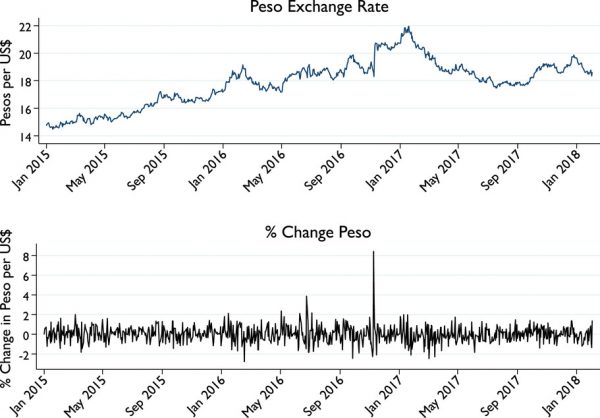
@realDonaldTrump: “The Mexican legal system is corrupt, as is much of Mexico. Pay me the money that is owed me now—and stop sending criminals over our border” (February 24, 2015, Twitter)
We know that social media has huge impacts on politics, but did you know that it can also drive international economic trends and investment practices? This is one of the major findings in new research by Allyson Benton and Andrew Philips. The authors demonstrate how social media allows investors to gather both policy information and policy resolve of future governments; this is particularly salient in times when there are political newcomers and their policy positions are unknown. More specifically, the authors show how social media affects currency volatility.
The authors analyzed over 400 of President Trump’s Mexico-related policy tweets from January 1, 2015 to February 2, 2018, comparing the tweets with the volatility of the U.S. Dollar – Mexican Peso exchange rate. Using qualitative software, they analyze the relationship of these tweets to the volatility of the exchange rate. They find that Trump’s Mexico-related tweets, especially those of stronger sentiment, negatively impacted the exchange rate before and after his Mexico-related policy views were known.
Social media is one way potential future leaders can divulge future policy directions, and information gleaned from social media affects both investors and financial markets. This is important because the USD-MXN exchange rate has the ability to harm companies’ profits and valuations during foreign transactions. Social media usage by highly visible public actors thus has social, cultural, and economic implications.
As presidential elections approach, citizens and investors alike try to anticipate the future policy directions of their government. This new research shows that social media allows not just voters, but also financial investors to gather information on future politicians’ policy inclinations and dedication to their policy goals which can impact international commerce and markets.
